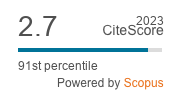Actitud ante las Fake News: Estudio del caso de los estudiantes de la Universidad del País Vasco
DOI:
https://doi.org/10.26441/RC19.1-2020-A10Palabras clave:
noticias falsas, fake news, estudiantes, universitarios, millenials, Generación ZResumen
Internet y las redes sociales se han convertido en la vía de información más atractiva y accesible para los jóvenes. Objetivos. Examinar las conductas de los jóvenes universitarios ante las fake news y pulsar su opinión sobre este fenómeno. Metodología. Encuestas semiabiertas realizadas principalmente al alumnado Periodismo de la Universidad del País Vasco. En una segunda fase se amplía el estudio a estudiantes de otras áreas de conocimiento. Resultados. Los universitarios se informan principalmente en el entorno online y un alto porcentaje confiesa haber caído en la trampa de las fake news en alguna ocasión. Conclusiones y discusión. Se detectan un alto índice de alerta por parte de los universitarios ante las noticias falsas y algunas diferencias, según el área de conocimiento, de las temáticas que consideran más invadidas por las fake news.
Descargas
Referencias
Alberto Notario, C. (2018). La generación del Milenio y su papel en el futuro de la inteligencia y la seguridad. En Nota de Futuro 1/2018. http://intranet.bibliotecasgc.bage.es/intranet-tmpl/prog/local_repository/documents/documents/20576_21824.pdf
Allcott, H. y Gentzkow, M. (2017). Social media and fake news in the 2016 election. En The National bureau of economic research. https://pubs.aeaweb.org/doi/pdfplus/10.1257/jep.31.2.211 DOI: https://doi.org/10.3386/w23089
Anderson, J., y Rainie, L. (2012). Millennials will benefit and suffer due to their hyperconnected lives. http://www.pewinternet.org/2012/02/29/millennials-will-benefit-and-suffer-due-totheir-hyperconnected-lives/
Babbie, E. (1999). Técnicas de la investigación social. Thompson.
Banaji, Sh., & Buckingham, D. (2013). The Civic Web. Young People, the Internet and Civic Participation. Cambridge, MA: The MIT Press. DOI: https://doi.org/10.7551/mitpress/8949.001.0001
Del Barrio, A. y Ruiz, I. (2017). Hábitos de uso del whatsapp por parte de los adolescentes. INFAD Revista de Psicología, Nº1, Monográfico 1, 23-30. DOI: https://doi.org/10.17060/ijodaep.2017.n1.v2.915
Berinsky, A. (2017). Rumors and health care reform. Experiences in political misinformation. Bristish Journal of Political Science, 47 (2): 241-262. DOI: https://doi.org/10.1017/S0007123415000186
Brandtzaeg, P., Folstad, A. & Chaparro, M. A. (2017). How Journalists and Social Media Users Perceive Online Fact-Checking and Verification Services. Journalism Practice, 12(9), pp. 1109-1129. https://doi.org/10.1080/17512786.2017.1363657 DOI: https://doi.org/10.1080/17512786.2017.1363657
Casero, A. (2009). Hacia la opinión pública 2.0. El Impacto del periodismo ciudadano sobre la esfera pública. En Medina, J., Rom, J.y Canosa, F. (eds). La Metamorfosis del espacio mediático. Trípodos.
Costera Meijer, I. (2007). The Paradox of Popularity; How Young People Experience the News. Journalism Studies, 8 (1), 96–116. DOI: https://doi.org/10.1080/14616700601056874
Deuze, M. (2005). Mediawork. Cambridge, MA: Polity Press.
Drok, N. y Hermans, L. (2016). Is there a future for slow journalism? Journalism Practice, 10 (4), 539-554. DOI: https://doi.org/10.1080/17512786.2015.1102604
Fernández Cruz, F. J. y Fernández Díaz, M. J. (2016). Los docentes de la generación Z y sus competencias digitales. Comunicar, Nº 46, 97-105. DOI: https://doi.org/10.3916/C46-2016-10
Fisher, C. (2016). The trouble with ‘trust’ in news media. Communication Research and Practice, 2(4), 451-465. DOI: https://doi.org/10.1080/22041451.2016.1261251
Foro Económico Mundial. (2017). Global Shapers Annual Survey 2017. Sharpers Survey 2017: http://www.shaperssurvey2017.org
Friggeri, A., Adamic, L.A. Eckles, D. and Cheng J. (2014). Rumor Cascades. Eighth International AAAI Conference on Weblogs and Social Media.
Gil, G. y Martínez, M. R (2001). Metodología de las Encuestas. En Navas, M.J. (Ed.). Métodos, Diseños y Técnicas de Investigación Psicológica. Madrid. UNED
Gottfried, J. & Shearer, E. (2016). News Use Across Social Media Platforms 2016. Pew Research Center. Journalism & Media. https://www.journalism.org/2016/05/26/news-use-across-social-media-platforms-2016/
Gottfried, J., & Barthel, M. (2015). How Millennials' political news habits differ from those of Gen Xers and Baby Boomers, Pew Research Center. https://www.pewresearch.org/fact-tank/2015/06/01/political-news-habits-by-generation/
Guerrero Pérez, E. (2018). La fuga de los millennials de la televisión lineal. Revista Latina de Comunicación Social, 73, 1231-1246. http://www.revistalatinacs.org/073paper/1304/63es.html DOI: https://doi.org/10.4185/RLCS-2018-1304
Hidalgo Pérez, A. A. (2017). Nuevo escenario en la gestión del capital humano. Harvard Deusto Business Review, 268, 36-47.
Jones, A. (2008). Losing the news: The future of the news that feeds democracy. Oxford University Press.
Laufer, P. (2011). Slow News; A Manifesto for the Critical News Consumer. Oregon State University Press.
Leahy, K., McGinley, J., Thompson, J., & Weese, T. (2011). Intelligence Community Assessment: Generational Difference in Workplace Motivation. Intelligence Reform and Transformation, 29(1), 1-16.
Lenhart, A., Purcel, K., Smith, A. & Zickuhr, K. (2010). Social Media and movil Internet use among teens and young adults. Pew Internet and American life. https://files.eric.ed.gov/fulltext/ED525056.pdf
López, A. (2011). Usos y actitudes de estudiantes universitarios futuros profesores sobre tecnologías de la información y la comunicación (TIC) y recursos sociales de internet. Questión, 31. http://sedici.unlp.edu.ar/handle/10915/34531
Magallón, R. (2016). El ADN de la Generación Z. Entre la economía colaborativa y la economía disruptiva. Revista de Estudios de Juventud, 114, 29-44.
Marchi, R. (2012). With Facebook, Blogs, and Fake News, Teens Reject Journalistic “Objectivity”. Journal of Communication Inquiry, 36(3) 246–262. DOI: https://doi.org/10.1177/0196859912458700
Parra, P. & Oliveira, L. (2018). Fake News: Una revisión sistemática de la literatura. Obserbatorio (OBS), Nº extra 1, 54-78.
Parreira do Prado, M. (2019). La proliferación de las “fake news” y sus algoritmos daña la cultura democrática. Ámbitos. Revista Internacional de Comunicación, 45, 89-106. DOI: https://doi.org/10.12795/Ambitos.2019.i45.06
Pariser, E. (2011). The filter of bubble. Penguin Books. DOI: https://doi.org/10.3139/9783446431164
Palomo, B. y Sedano, J. (2018). WhatsApp como herramienta de verificación de fake news. El caso de B de Bulo. Revista Latina de Comunicación Social, 73, 1384-1397. http://www.revistalatinacs.org/073paper/1312/71es.html DOI: https://doi.org/10.4185/RLCS-2018-1312
Pew Research Center (2014). Millennials in Adulthood: Detached from Institutions, Networked with Friends. Pew Research Center. http://www.pewsocialtrends.org/2014/03/07/millennials-in-adulthood/
Plazibat, I., Dadić, M., & Petričević, D. (2017). Do the millennials make a difference in retail?. Theory and Applications in the Knowledge Economy, 186. https://www.researchgate.net/publication/322686268_Organizational_Culture_and_Leadership's_Impact_on_a_Safety_Program_Change_Model
Spratt, H. E. & Agosto, D. (2017). Fighting fake news because we all deserve the truth: Programming idea for teaching teens media literacy. Young Adult Library Services, 15 (4), 17-21.
Schroer, W. (2008). Defining, Managing and Marketing to Generation X, Y and Z. The Portal, 10, https://s3.amazonaws.com/rdcms-iam/files/production/public/newimages/portalpdfs/2008_03_04.pdf
Visauta, B. (1989). Técnicas de investigación Social. I: Recogida de datos. Promociones y Publicaciones Universitarias.
Wells, N. (2015). Who are the Millennials Anyway? CNBC. http://www.cnbc.com/2015/05/22/who-are-the-millennials-anyway.html
Wineburg, S. & McGrew, S. (2016). What Students Don't Know About Fact-Checking. Education Week Vol. 36, Issue 11, 22-28. http://odl.gmu.edu/wp-content/uploads/Why-Students-Cant-Google-Their-Way-to-the-Truth-Education-Week.pdf
Publicado
Número
Sección
Licencia
Revista de Comunicación conserva los derechos patrimoniales de las obras publicadas bajo una licencia Creative Commons 4.0 y permite al autor mantener los derechos patrimoniales sin restricciones.
Esta revista y sus artículos se publican bajo la licencia Creative Commons Atribución-NoComercial-SinDerivadas 4.0 Internacional (CC BY-NC-ND 4.0), por lo cual el usuario es libre de: compartir, copiar y redistribuir el material en cualquier medio o formato, siempre y cuando: dé crédito de manera adecuada, brinde un enlace a la licencia e indique si se han realizado cambios; no use nuestro contenido con propósitos comerciales; y/o remezcle o transforme el material.






 Portal de Revistas de la Universidad de Piura.
Portal de Revistas de la Universidad de Piura.